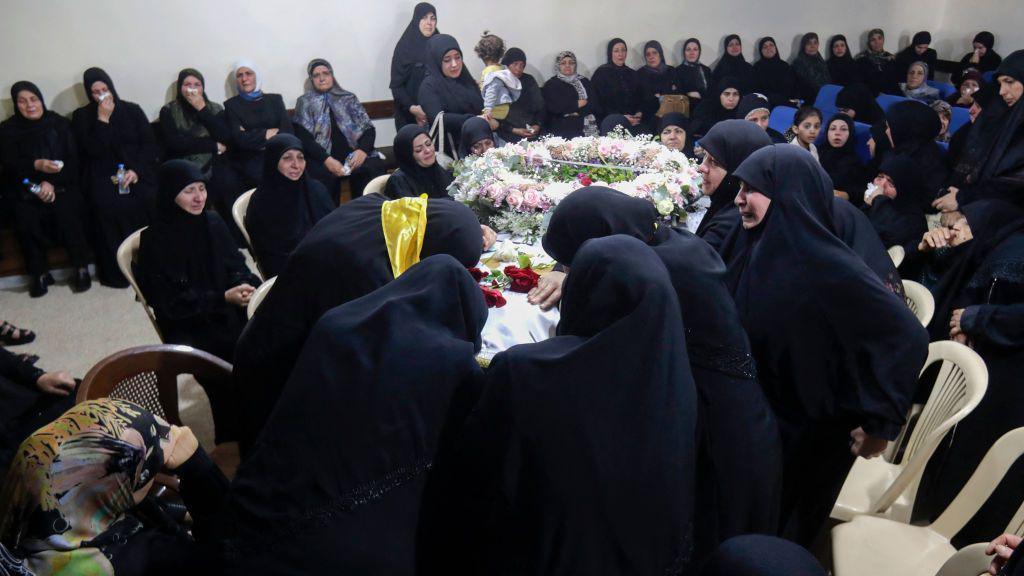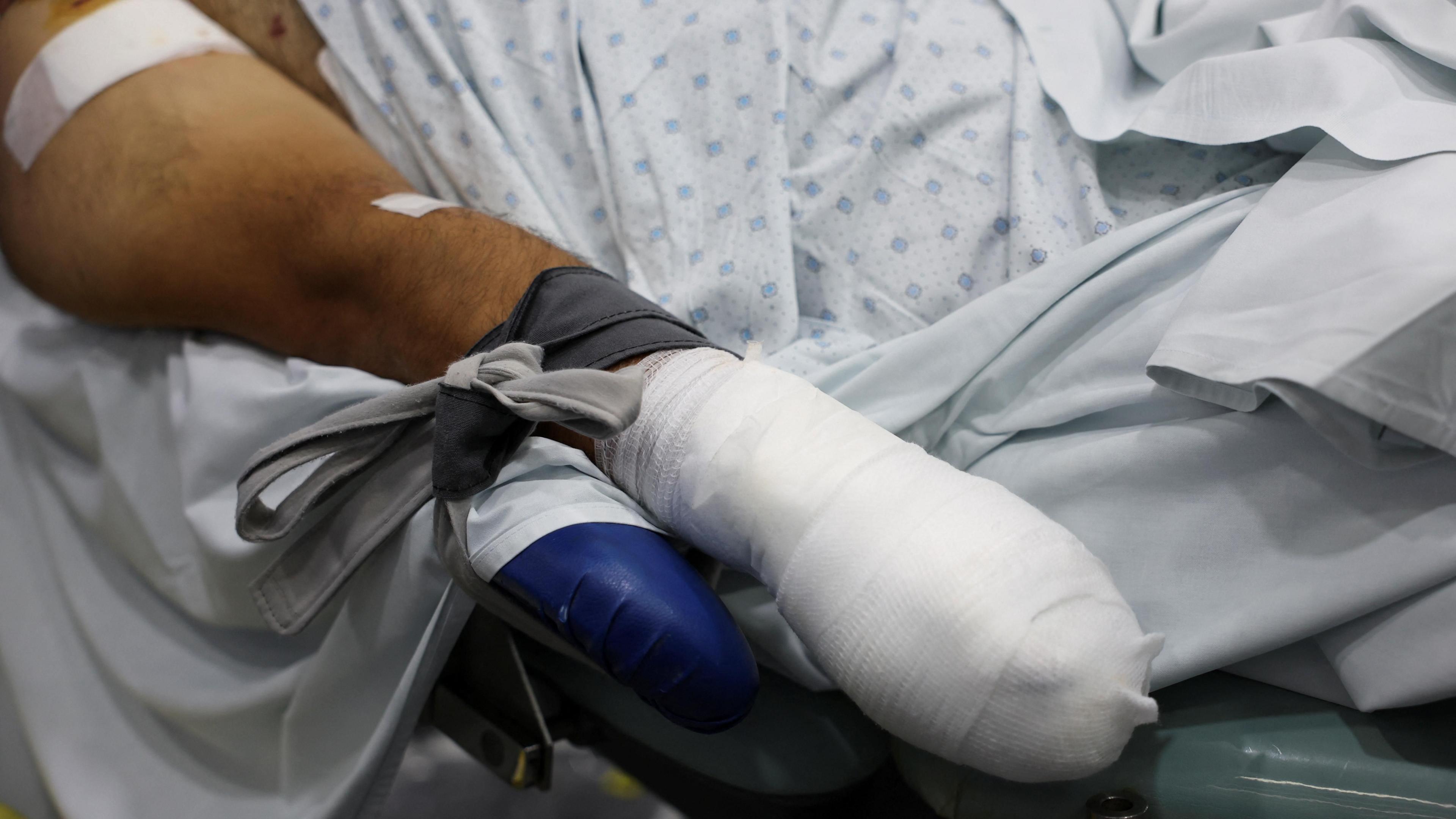Death toll from Hezbollah pager explosions in Lebanon rises to 12

A girl said to have been killed by one of the exploding pagers was buried in the Bekaa Valley on Tuesday
- Published
Lebanon’s health minister says the number of people killed when pagers used by members of the armed group Hezbollah exploded on Tuesday has risen to 12, including two children and four healthcare workers.
Firas Abiad told a news conference that almost two-thirds of the 2,800 wounded people needed some form of surgery to their face, eyes or hands, and that many had suffered amputations.
Hezbollah, which is backed by Iran, blamed Israel for the attack and warned that it would face a “severe reckoning”.
While Israel declined to comment, media reports cited US and Lebanese sources as saying Israeli operatives had hidden small amounts of explosives inside recently imported pagers.
The UN, US and UK have appealed for calm and restraint, amid fears of an all-out war.
Israel’s leaders have said they are ready to step up military action to return tens of thousands of displaced people from the north of the country to their homes after 11 months of cross-border fighting between Israel and Hezbollah, sparked by the war in Gaza.
Hezbollah says it is acting in support of Hamas - which is also backed by Iran and proscribed as a terrorist organisation by Israel and many Western countries - and will only stop its attacks once the fighting in Gaza ends.
Bowen: Tactical triumph for Israel, but Hezbollah won't be deterred
- Published18 September 2024
Taiwan pager maker stunned by link to Lebanon attacks
- Published18 September 2024
What we know about the Hezbollah pager explosions
- Published20 September 2024
Warning: This story contains details which some people may find upsetting
Hospitals across Lebanon were overwhelmed by casualties on Tuesday afternoon, after thousands of pagers used by Hezbollah blew up almost simultaneously in shops, homes, and cars, and on streets.
Tracy Chamoun, a Lebanese writer, politician and former ambassador to Jordan, told the BBC the aftermath of Tuesday’s explosions was “horrifying”.
She had been travelling in a car along a flyover in Beirut’s southern suburbs - a stronghold of Hezbollah - when she suddenly saw people lying on a road below.
“All hell broke loose as they started to scramble to take these people to hospital. The cars were just pushed aside as motorbikes and cars came through with people covered in blood,” she said. “One of the injured men who I saw had his eye blown out. Another one had half of his face ripped off.”
Hezbollah has provided no details about what happened, but it is known that the group has long relied on pagers for communications due to concerns among its leaders about mobile phones being hacked or tracked by Israeli security forces.
Ms Chamoun said the pagers had “emitted a sound before being detonated to encourage people to take them out of their pockets or from their desks and lift them to their heads”.
US and Lebanese sources told the New York Times, external and Reuters news agency, external that Israel planted small amounts of explosives inside at least 3,000 pagers ordered by Hezbollah this year from a Taiwan-based electronics manufacturer, Gold Apollo.
"The Mossad injected a board inside of the device that has explosive material that receives a code. It's very hard to detect it through any means," one Lebanese security source told Reuters.
Gold Apollo’s founder denied it had anything to do with the blasts and said it had signed an agreement with another company based in Budapest, BAC Consulting, to manufacturer the devices and use its name. The BBC has attempted to reach BAC.
Axios meanwhile cited, external US officials as saying that Israel had decided to blow up the pagers “out of concern its secret operation might have been discovered”. "It was a use it or lose it moment," one official was quoted as describing the timing.
Watch how the Hezbollah exploding pagers attack unfolded
Lebanon’s health minister said an eight-year-old girl and an 11-year-old boy were among the dead, as well as several healthcare workers from Dahiyeh, in southern Beirut, who had been using pagers.
Of the 2,800 people who were wounded, about 750 were in the south of Lebanon, 150 in the Bekaa Valley, and about 1,850 in the capital and its suburbs, he added.
Mr Abiad said a large number of patients were in intensive care, some due to injuries affecting their ability to breathe. Others had injuries related to bleeding, including brain haemorrhages.
Iran's ambassador to Lebanon, Mojtaba Amani, was injured by one of the blasts, but his family and Iranian officials said he was in a "good and stable condition".
In an interview with the BBC, an ophthalmologist at Mount Lebanon University Hospital in Beirut said the past 24 hours there had been “a nightmare”.
“Unfortunately, we were not able to save a lot of eyes," Dr Elias Warrak said, adding that more than 60 to 70% of the patients ended up with at least one eye removed.
“Some of the patients, we had to remove both eyes. It kills me. In my past 25 years in practice, I’ve never removed as many eyes as I did yesterday.”
Hezbollah has announced the deaths of 12 fighters since Tuesday afternoon, including the son of the Hezbollah MP Ali Ammar. However, it has not given details on the locations and circumstances, saying only that they were “martyred on the road to Jerusalem" - a phrase it has been using to refer to fighters killed by Israel.
The only death the group directly attributed to a pager explosion was an employee of the al-Rassoul Al-Aazam Hospital in southern Beirut.

Lebanon's health minister said many of the wounded by the blasts had lost hands or fingers
Hezbollah said in a statement on Wednesday that it would continue operations "in support of Gaza" and "defend Lebanon".
“This path is ongoing and separate from the severe reckoning that the criminal enemy must face for the massacre it committed on Tuesday against our people, our families, and our fighters in Lebanon,” it added.
The UN Special Co-ordinator for Lebanon, Jeanine Hennis-Plasschaert, warned of “an extremely concerning escalation in what is an already unacceptably volatile context”.
She urged all parties to “refrain from any further action, or bellicose rhetoric, which could trigger a wider conflagration that nobody can afford”.
US Secretary of State Antony Blinken denied that his country - Israel’s closest ally - had known about or been involved in the explosions.
Negotiating a Gaza ceasefire deal between Israel and Hamas would be the best way to reduce regional tensions, he said at a news conference with his Egyptian counterpart in Cairo.
“We remain very clear about the importance of all parties avoiding any steps that could further escalate the conflict that we're trying to resolve in Gaza to see it spread to other fronts,” he added.
Israel has yet to respond to any claims. However, the Israeli military quoted the head of its Northern Command, MG Ori Gordin, as saying forces were "determined to change the security reality as soon as possible" along the border with Lebanon.